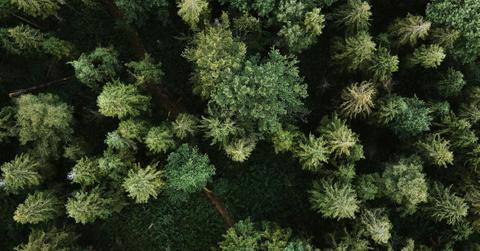Branching Out: Researchers Discover Oldest Fossilized Forest, Dating Back 390 Million Years

Newly discovered fossil trees belong to the world's oldest known forest.
New research has unveiled the discovery of fossilized trees in southwest England, offering a glimpse into Earth's earliest-known forest.
Dated at approximately 390 million years old, these ancient trees predate the previously identified Gilboa fossil forest in New York state by about 4 million years, making them the oldest known forest in the world, LiveScience reported.
The study, led by Neil Davies from the University of Cambridge, sheds light on the evolution of forest ecosystems. Davies noted that this finding underscores the transition from primitive forest formations to more established ones within a relatively short span of a few million years.
The significance of the discovery lies in its designation as the oldest fossil forest.
Furthermore, the comparison between this newly discovered forest and the Gilboa fossil forest reveals intriguing differences in their ecosystems. Unlike the diverse plant life found in Gilboa, the ancient forest in southwest England appears to have been dominated by a single type of plant known as cladoxylopsids, resembling palm trees but actually more closely related to ferns and horsetails.
Standing between 6.5 and 13 feet tall, these cladoxylopsid trees formed a relatively short forest canopy.
The fossilized trees, preserved as hollow trunks filled with sediment and flattened fallen logs, offer a glimpse into their ancient structure, complete with visible scars where branches once attached.
The discovery occurred serendipitously during fieldwork in the Hangman Sandstone Formation, dating back to the Middle Devonian period. This period, characterized by a warm and dry climate, saw the emergence of land colonization by plants.
- Botanical Breakthrough: Ancient 'Dinosaur Trees' Thought Extinct for 2 Million Years Rediscovered
- What Lies Beneath: NASA Scientist Believes Aliens May Have Found 'Perfect' Hiding Spot in Earth's Oceans
- Global Threat: Russia Insider Warns West of 'World War Using Nuclear Weapons' Amid Escalating Support for Ukraine
Christopher Berry, a co-author of the study, expressed astonishment at finding these familiar trees in their original growth positions, providing valuable insights into their ancient habitat.
While older trees exist worldwide, this discovery represents the earliest example of a forest with closely spaced trees growing in abundance.
Never miss a story — sign up for the Front Page Detectives newsletter. Be on the scene the moment news breaks.
Tracks left by small Devonian creatures among the fossil trees hint at the ecosystem's inhabitants, primarily consisting of arthropods and amphibian-like organisms.
Originally focused on sediment examination, the researchers stumbled upon this remarkable find, suggesting a significant shift in Devonian plant ecology around 390 million years ago. This discovery opens new avenues for understanding the early evolution of terrestrial ecosystems and the intricate relationships between plants and their environment.
Become a Front Page Detective
Sign up to receive breaking
Front Page Detectives
news and exclusive investigations.
